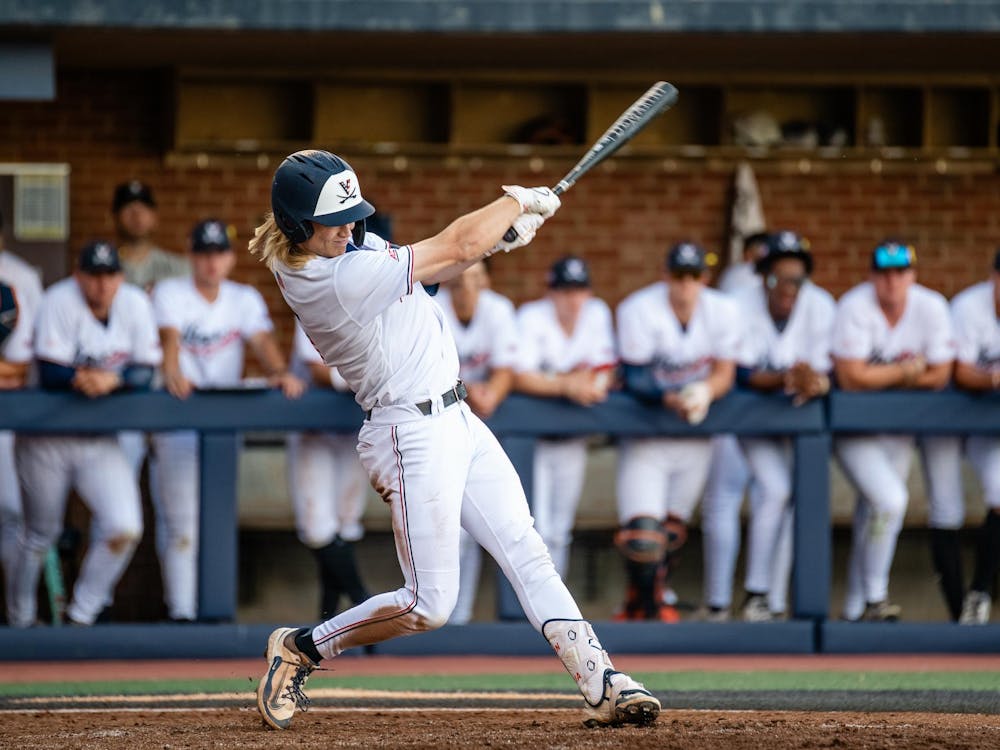BLACKSBURG, Va.
Is there anything more frustrating in sports than watching your team lose because of squandered opportunities? Yes. Watching your team squander opportunities because of the same weaknesses that have persisted all season without sufficient adjustment.
The Cavaliers lost to rival Virginia Tech thanks to a porous secondary, uninspiring receivers and unimaginative playcalling. For the first time, Virginia matched up closely in athletic talent with Florida State, Miami and Tech but lost to all three because it can neither create nor prevent big plays.
The first quarter, however, seemed to indicate something different. Marquis Weeks took the opening kickoff 54 yards into Hokie territory, and Alvin Pearman ran 78 yards off-tackle behind Elton Brown, who somehow managed to throw two hole-opening blocks on the play. Those two plays led to zero points after Connor Hughes' field goal attempt was blocked on the first drive and Wali Lundy fumbled on the second.
Sure, Pearman made a heroic 32-yard touchdown catch on third-and-11, outleaping sure-fire pro prospect Jimmy Williams in the end zone. But otherwise, big plays proved to be far more detrimental to the Cavaliers, as Tech scored all three of its TDs on plays of more than 30 yards.
Two of those Hokie touchdowns came on deep passes misplayed by Virginia's secondary. On the first, Weeks blew his responsibilities in the cover-two defense, allowing Tech's Josh Hyman to slip behind him for an easy score. On the second touchdown, cornerback Tony Franklin had tight coverage but failed to turn around in time to defend Bryan Randall's pass. The point might be moot, though, as I'm not sure Franklin was capable of matching up with the athletic Hyman.
The Tech counterparts of the Cavaliers' DBs came into the game ranked fifth in the nation. Conversely, Virginia's wideouts collectively entered with just 55 receptions and two touchdowns. For the record, there are 43 Division-IA players who individually have at least 55 catches.
Michael McGrew, Deyon Williams, Fontel Mines and Imhotep Durham are all serviceable receivers, but none of them strike fear in a defensive coordinator. Unable to stretch the defense, Virginia's wideouts were unable to prevent Tech from packing players into the box and stuffing the run.
The lack of a vertical passing game will hurt any offensive coordinator's ability to diversify the playbook, but Virginia's Ron Prince hardly seemed willing to deviate from the Cavaliers' three primary running plays. I know we applauded that consistency earlier in the season, but that was before Marques Hagans threw for 205 combined yards against Miami and Tech. It's one thing to be able to run the ball on the road in November, as Al Groh aimed to do all season, but it's another thing altogether to be able to run in addition to passing.
In game number 11, Prince continued to treat Virginia's improved running game the way a child plays with a new toy he fears might disappear if he doesn't play with it every other second. The Cavs racked up 188 rushing yards, but 78 of them came on one play. Subtract Pearman's long run, and Virginia had just 110 yards on 45 carries -- a 2.4 yards per rush average. Meanwhile, Hagans threw the ball just 14 times.
The Cavaliers ran the ball on nearly every first and second down, often leading to third-and-six or more. Even good passing teams have trouble converting in those situations.
Even more laughable was the predictability of Prince's play calls. Excessive bootlegging was the name of the game in all obvious passing situations. Also, every time the Cavaliers lined up in a shotgun with five receivers, Prince called for Hagans to run a quarterback draw. The surprise element gets lost if the same formation always equates to the same play.
What makes this loss further inconsolable were the heavy expectations placed on this year's Virginia team. Rising to as high as number six in the country, the Cavaliers were supposed to be darkhorse national contenders, or so said Sports Illustrated.
Instead, Virginia couldn't beat any of the top three teams in its conference, and the decisions of several underclassmen to stay in school or jet to the pros could make or break next year. Regressing from the Tire Bowl to a possible bowl game in Idaho probably isn't a strong enticement to stay.






